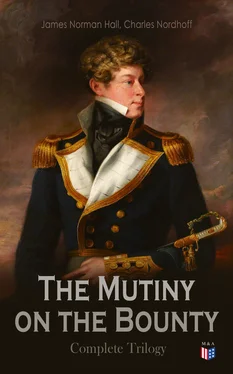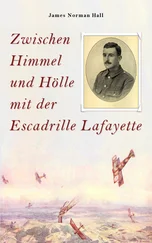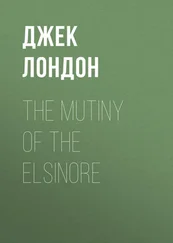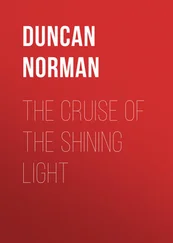With her marriage, Tehani seemed to take on a new dignity and seriousness, though in the privacy of our home she showed at times that she was still the same wild tomboy who had beaten me at swimming in Matavai. I was working on my dictionary every day, and Sir Joseph Banks himself could not have entered into these labours with greater enthusiasm than did my wife. She directed our household with a firmness and skill that surprised me in so young a girl, leaving me free to do my writing and to divert myself with fishing parties, or with hunting wild boars in the hills. But I preferred excursions in which Tehani could accompany me, and missed many a boar hunt in order to take my wife on short voyages in our sailing canoe.
About a month after our marriage, Tehani and I sailed down to Matavai for a visit to my taio. I was eager to see old Hitihiti, as well as Stewart, Morrison, and other friends among the Bounty’s people settled there. The distance is about fifty miles, and with the strong trade wind abaft the beam we made the passage in less than five hours, arriving early in the afternoon.
“Your friends are building a ship,” Hitihiti informed me as we dined. “Morrison and Millward, the man with him at the house of Poino, are directing the task, and several others are helping. They have laid the keel and made fast the stem and stern. They are working on the point, not far from the sea.”
Toward evening we strolled across to the little shipyard—Hina, her father, Tehani, and I. Morrison had chosen a glade about a hundred yards from the beach, an open grassy spot shaded by tall breadfruit trees. A crowd of Indians sat about on the grass, watching the white men at work. Their interest was intense, and in return for the privilege of being spectators they kept the shipbuilders more than supplied with food. The great chief Teina, to whom the land belonged, was there, with his wife Itea. They greeted us affably, and at that moment Morrison glanced up and caught my eye. He laid down his adze, wiped the sweat from his eyes, and took my hand heartily.
“We have heard of your marriage,” he said. “Let me wish you happiness.”
I made him known to Tehani, and as he pressed her hand young Tom Ellison came up to me. “What do you think of our ship, Mr. Byam?” he asked. “She’s only thirty feet long, but Mr. Morrison hopes to sail her to Batavia. We’ve christened her already: Resolution’s to be her name. By God, it takes resolution to build a ship without nails, or proper tools, or sawn-out plank!”
I shook hands with old Coleman, the Bounty’s armourer, and with the German cooper, Hillbrandt. Norman and McIntosh, the carpenter’s mates, were there, and Dick Skinner, the hairdresser who had been flogged in Adventure Bay. All worked with a will, under Morrison’s direction; some impelled by a desire to reach England, others, conscious of their guilt, by the fear that a British ship might take them before their little vessel could set sail.
At sunset the shipwrights laid down their tools, and, leaving Tehani to return to the house with Hina and my taio, I accompanied Morrison to his residence at the foot of One Tree Hill. He and Millward lived with the warrior Poino, their friend, a stone’s throw from Stewart’s house.
I found Stewart pottering about his garden in the dusk. He had made Tipau’s wild glen a place of ordered beauty, with paths leading this way and that, bordered with flowering shrubs, and shaded rockeries where he had planted many kinds of ferns. He made me welcome, straightening his back and shaking the earth from his hands.
“Byam, you stop to sup, of course? And you too, Morrison?”
Ellison passed us at that moment on his way over the hill, for he lived in Pare, a mile to the west. Stewart liked the lad and called out to him: “I say, Tom! Won’t you stop the night? It will be like old times.”
“With all my heart, Mr. Stewart!” he said, grinning. “I’m half afraid to go home, anyhow.”
“What’s wrong?” asked Morrison.
“That wench of mine again. Last night she caught me giving her sister a kiss. I swear there was no harm intended, but do you think she would listen to reason? She knocked her sister down with a tapa mallet, and would have done the same for me if I had not run for it.”
Stewart laughed. “I’ve no doubt you deserved it.”
Peggy was calling us into the house, and half an hour later we sat down to our evening meal, served by old Tipau’s slaves. Stewart’s dining room was a large thatched house open to the air, and decorated with hanging baskets of ferns. A man stood at one end, holding aloft a torch which illuminated the place with a flickering glare. Peggy had gone off to sup with her women, and Tipau preferred to eat his meal alone.
“How long will it take you to complete your vessel?” I asked Morrison.
“Six months or more. The work goes slowly with so few tools.”
“You hope to reach Batavia in her?”
“Yes. From there we can get passage home on a Dutch ship. Five of us are to make the attempt—Norman, McIntosh, Muspratt, Byrne, and I. Stewart and Coleman prefer to wait here for an English ship.”
“I feel the same,” I remarked. “I am happy in Tautira, and glad of the chance to work on my Indian dictionary.”
“As for me,” said Stewart, “I find Tahiti a pleasant place enough. And I have no desire to be drowned!”
“Drowned be damned!” exclaimed Morrison impatiently. “Our little schooner will be staunch enough to sail around the world!”
“You haven’t told Mr. Byam about us,” put in Ellison. “We are going to start a little kingdom of our own. Desperate characters we are—not one but would swing at the yardarm if taken by a British ship! Mr. Morrison has promised to set us down on some island west of here.”
“It is the best thing they can do,” said Morrison. “I shall try to find an island where the people are friendly. Tom is coming, as are Millward, Burkitt, Hillbrandt, and Sumner. Churchill intends to stay here, though he’s certain to be taken and hanged. Dick Skinner believes it his duty to give himself up and suffer for his crime. As for Thompson, he is more of a beast than a man, and I would not have him on board.”
“Where is Burkitt?” I asked.
“He and Muspratt are living in Papara,” said Stewart, “with the chief of the Teva clan.”
“They offered to join us in the work,” Morrison added, “but neither man has any skill.”
I was glad to have news of the Bounty’s people, most of whom I liked. We talked late into the night, while Tipau’s man lit torch after torch from the bundle at his side. The moon was rising when I took leave of my friends and trudged home along the deserted beach.
I had occasion, the next morning, to recall what Morrison had said of Thompson, the most stupid and brutal of the Bounty’s crew. He and Churchill had struck up an oddly assorted friendship, and spent most of their time sailing about the island in a small canoe, fitted with a sail of canvas. Thompson disliked the Indians as much as he distrusted them, and on shore was never without a loaded musket in his hand.
Going down to the beach for an early bath in the sea, I found the pair encamped by their canoe, with a sucking pig roasting on the coals near by. “Come—join us at breakfast, Mr. Byam,” called Churchill, hospitably.
Thompson looked up, scowling. “Damn you, Churchill,” he growled—“Let him find his own grub. We’ve no more than enough for ourselves.”
Churchill flushed. “Hold your tongue, Matt,” he exclaimed, “Mr. Byam’s my friend! Go and learn manners from the Indians, before I knock them into your head!”
Thompson rose and stalked off to a sandhill, where he seated himself sulkily, his musket between his knees. I had already breakfasted, and as I turned away I saw a dozen men pulling a large sailing canoe up on the beach, and the owner and his wife approaching us. The man carried in his arms a child of three or four years. They stopped by Churchill’s canoe to admire its sail of canvas, and turned to wish us good day. The Indian woman leaned over the boom to examine the stitching of the bolt rope, and at that moment I heard Thompson’s harsh voice.
Читать дальше











